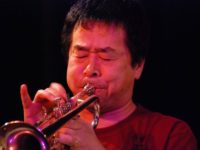Norikatsu Koreyasu’s sudden passing in September of 2011 set the Gato Libre quartet adrift but eventually, the Japanese improvised music combo found a viable replacement for him. The thing is, Gato Libre leader and trumpeter Natsuki Tamura isn’t a musician who does things conventionally, and he didn’t do so here, either. Thus, the late bassist has been replaced by trombone player Yasuko Kaneko.
Tamura is also shrewd enough to modify the music to fit his newest member, and Gato Libre’s first album of its rebirth as a two-horn ensemble. DuDu — out May 27, 2014 on Libra Records — is a portrait of a smooth, successful transition.
Gato Libre, which means roughly “free cat” in Spanish, has always maintained a rustic, graceful Iberian essence in its music, courtesy of Satoko Fujii’s accordion and Kazuhiko Tsumura’s nylon string guitar. Tamura’s impassioned, desolate trumpet tone slides right into that temperament, and even when he stretches beyond tonality, as he’s often apt to do, he somehow manages to maintain that vibe.
Now, he’s got a partner in crime and though Tamura’s footprint has expanded perhaps a little, Kaneko’s trombone provides a viable brass counterweight to his own horn. Kaneko takes over Koreyasu’s spot but not his role; she deploys the wide resonance of the trombone to add color to these songs that unfold, not simply played.
For “DuDu,” Kaneko’s contribution is seemingly minor but crucial: she launches a three-not ostinato that sends the song into a new direction after Tamura’s graceful lead that introduces the title song gives way to Fujii’s solo accordion breathing shorter and faster. Kaneko gets her first lead opportunity on the next track, “Gato,” expressing the desolate opening statement. She then gets to open up her luscious articulation, and Tamura counters with his signature noteless puffs on his trumpet.
In Gato Libre, you have to be able to play with both great restraint and total abandon in equally large measures. The group slams on the brakes during the course of playing of the bleak, tempered “Nanook” so that Tamura and Kaneko can engage in a chase for impossible notes. “Mouse” is even more episodic, going from the solemn guitar of Tsumura to the plunged trombone of Kaneko sparring with Fujii’s abrasive accordion to ending with Tamura’s skittering trumpet with Kaneko chasing close behind and coalescing around a brief, Cossack statement.
Amid these outbursts of free playing are plenty of moments of quiet beauty; for example, Tamura’s stellar trumpet lead lifts “Rainy Day” through both his intonation and personal way of expression.
It was undoubtedly not an easy decision to carry on with Gato Libre after the loss of a key member, but DuDu assures us that it was the right decision.
- McCoy Tyner and Joe Henderson – ‘Forces of Nature: Live at Slugs’ (2024) - November 21, 2024
- Lydia Salnikova, “Christmas Means a Different Thing This Year” (2024): One Track Mind - November 19, 2024
- Darius Jones – ‘Legend of e’Boi (The Hypervigilant Eye)’ - November 15, 2024




